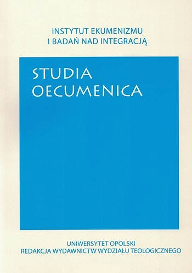New voices in the grassroots ecumenism – an outline of the postcolonial theological thought
New voices in the grassroots ecumenism – an outline of the postcolonial theological thought
Author(s): Piotr KopiecSubject(s): Christian Theology and Religion, Theology and Religion, Comparative Studies of Religion, History of Religion
Published by: Uniwersytet Opolski
Keywords: postcolonialism; deconstruction; liberation theology; epistemological change; grassroots ecumenism;
Summary/Abstract: Postcolonial theology is, beside liberation theology, contextual theology and intercultural theology, another theological approach that emerges on the theological margins and inspires many grassroots ecumenical organizations when adopting the postcolonial theory to theology. Like postcolonialism, it is not an orderly and integrated system of beliefs, rather it is a broad stream of thoughts, postulates and interpretations that often has little in common. Nevertheless, there are elements that set a common denominator. These might be classified in two groups of theological claims, firstly, deconstruction of the theological tradition, secondly, liberation from the bonds of Christian imperialism. The latter is regarded by postcolonial theology in two perspectives as well: socio-political and epistemological. According to postcolonial thinkers, the Church cooperated, assented and legitimised political power that down the centuries, maintained the structures of oppression, exclusion and subjugation. This conviction leads the postcolonial approach to the positions close to these of liberation theology, in particular, to the principle of the “option of the poor”. Secondly, postcolonialism claims Christianity must knock down the epistemological wall of its imperialist theologies, built only and exclusively on the European philosophy and European civilization. The article presents the crucial points of postcolonialism and its theological application. It shows that, on the one hand, its claims are often too revolutionary and too one-sided, on the other, the postulate of the epistemological change might be regarded as a proposal answering the crisis in the Western Christianity.
Journal: Studia Oecumenica
- Issue Year: 2019
- Issue No: 19
- Page Range: 19-31
- Page Count: 13
- Language: English, Polish

